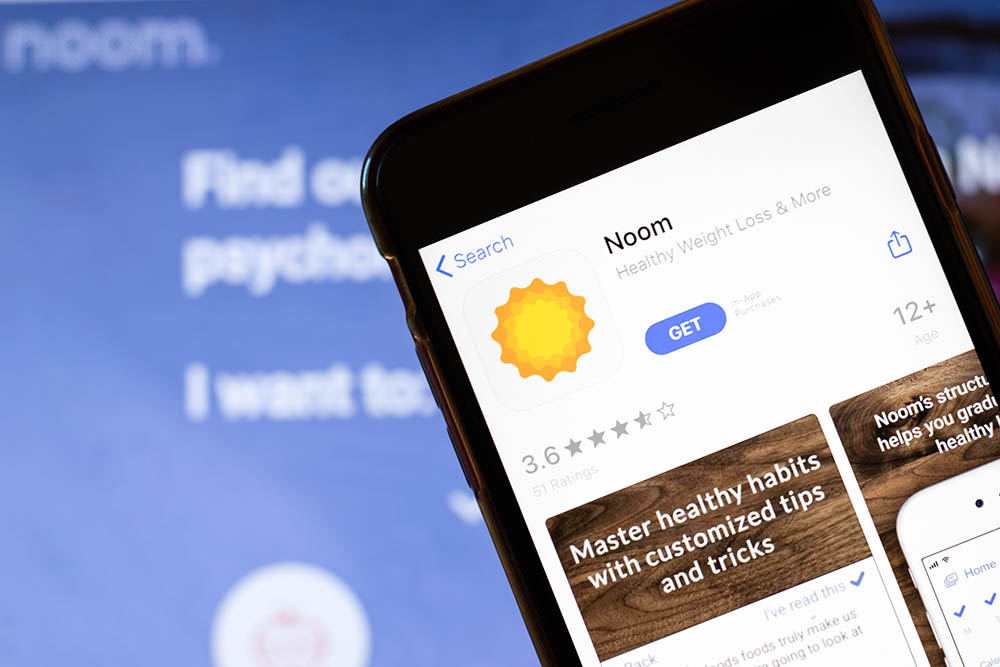



Noom is a weight loss program that has created a buzz among health enthusiasts lately, and you might be wondering whether or not it’s worth the hype.
Noom is an app designed to help people lose weight, get fit, and stay healthy. Subscription to Noom gives you access to a personalized diet plan and a health coach, as well as a traffic light system that ranks food based on how many calories they contain.
Users can also record their diet and exercise habits and discuss their weight loss journey on Noom’s social platform.
Through the unique traffic light system, Noom ranks foods as either “green”, “amber” or “red” depending on how many calories they contain.
For example, food such as spinach and broccoli, which contain few calories, would be considered “green”, whereas unhealthier foods that are considered “red” – such as chocolate and cookies – contain more calories and should therefore only be consumed in small amounts.
In order to provide the user with a personalized weight loss program, you’ll need to answer some questions regarding your weight, height, and lifestyle habits, in which the algorithm will then use to calculate a personalized weight loss plan.
According to the app’s creators, personalized weight loss plans can help deliver long-lasting weight loss results, as opposed to generic diets and weight loss fads.
Soon after you log into the app for the first time, you’ll be paired with an appropriate health coach who will be on-hand to provide relevant dietary information and advice to help you achieve your goals.
The idea behind Noom is to encourage people to self-monitor their weight loss journey.
It’s been proven by a 2017 study that people who frequently and consistently record their dietary habits are more likely to experience more consistent weight loss and keep it off in the long run.
On the other hand, while self-monitoring weight loss starts off successfully for many people, it tends to decline in time.
Noom aims to remedy this by providing a health coach to advise and encourage users, as well as a social aspect to the app where people can discuss their weight loss challenges and successes with other Noom users.
There’s also been some research into the effectiveness of Noom.
For example, in 2016, a study analyzed dietary data from Noom users who recorded what they ate at least twice a month for 6 months. It found that of 35,921 Noom users, 77.9% reported a reduction in body weight while using the app.
Researchers also found that users who monitored their weight and eating habits more frequently experienced more consistent weight loss.
In a separate study from the same year, researchers used Noom to deliver a diabetes prevention program (DPP) to 43 participants with prediabetes, each of whom were either overweight or obese.
The study aimed to investigate how effective the DPP was in promoting weight loss among participants.
All of the participants saw significant weight loss by week 16 and week 24 of using the DPP, with 64% of participants losing more than 5% of their body weight.
While this suggests that Noom could be successful in helping people lose weight, the study didn’t compare the app with any alternative programs or diets, and therefore it’s difficult to say whether Noom is really any more effective than alternative weight-loss strategies.
The price varies depending on the suggested plan that Noom recommends for you, and you then pay upfront for those months. For example, if you aim to lose 20 pounds you’ll likely be recommended a 2-month plan, and if you don’t lose the weight in this time, you’ll be charged another payment to continue with the program.
That said, Noom is quite reasonable compared to other weight loss programs such as Weight Watchers. A monthly plan is priced at $59 or annual membership will cost $199.
However, considering the add-on payments if you don’t reach your goals within the recommended window, the cost can easily add up, which is a complaint amongst reviewers.
This is Noom’s current subscription pricing plan – though they do offer significant discounts throughout the year, which are worth looking out for:
Noom offers you custom meal plans designed around the foods you like to eat. It does this by using your data inputs to create a custom diet plan from the Noom food list which meets your calorie requirements for the day.
This doesn’t mean you’re restricted however as if you want to change things up, you can simply add custom foods to your diet plan, and Noom will work these into your diet.
You eat the foods you want, but Noom calculates your portions, allowing you to stay within your calorie limits for the day.
The average Noom plan is designed to last 16 weeks, but you’re encouraged to buy up to twelve months at a time so that you can maintain your weight loss and prevent the weight from piling back on.
You’ll be given a recommended program length depending on your weight loss goals, and this will also influence how much you pay.
We always want to be transparent and honest about our article content. From time to time, we may link to products and services that compensate us for the referral. This does not affect your cost, but it does help us fund future content for this site.
These cheesy beer bread muffins are light, fluffy, and packed with savory flavor! The key…
I am thrilled with how incredibly delicious this Fench Onion Pot Roast turned out! The…
You guys love my marry me recipes and you go crazy over all my mushrooms…
Irish Brown Bread is a delicious twist on classic soda bread, offering a slightly sweet,…
These ground turkey tacos are full of fiesta flavor, all with less fat! Don't let…
Beef and Cabbage soup is filled with seasoned ground beef, cabbage, carrots, celery, kidney beans,…